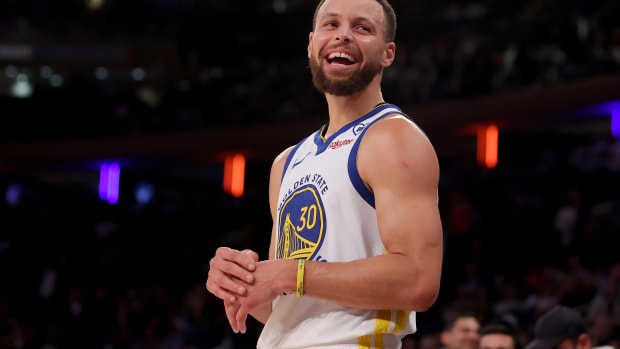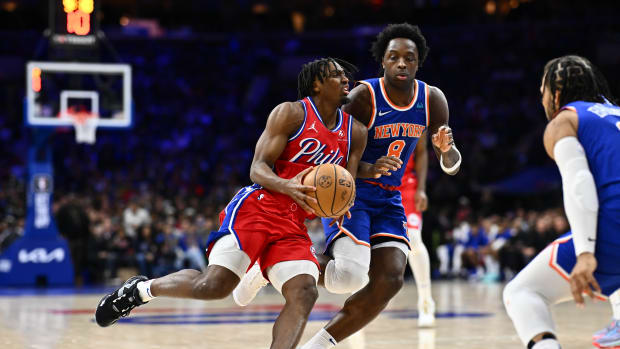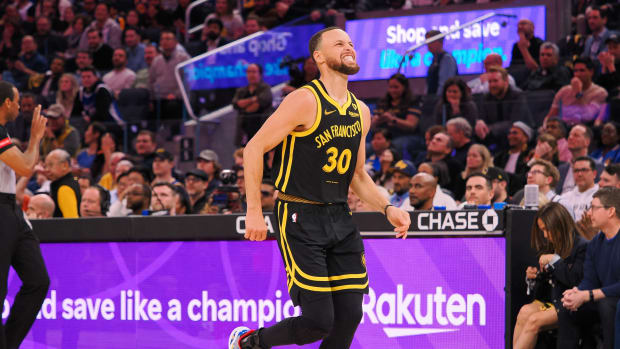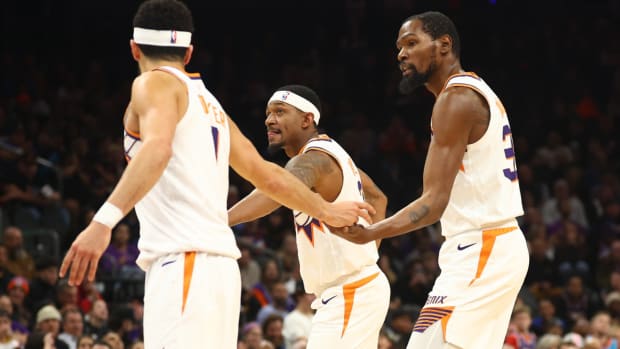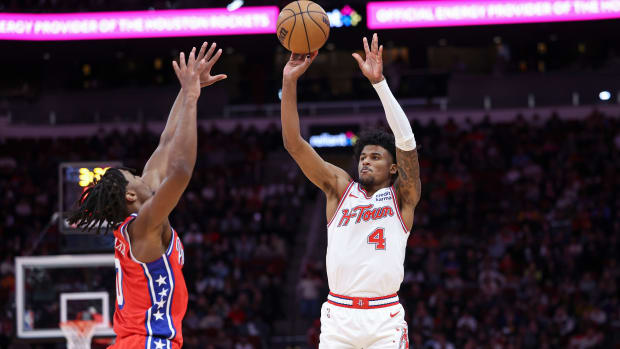Rockets waste prime opportunity, fall to Clippers without Paul in Game 1
HOUSTON—The Houston Rockets are a good basketball team, though not at all good enough to squander a plum opportunity without consequence. Their blunder, a 117-101 loss to the Clippers in the absence of Chris Paul, was as empty an effort as we've seen from the Rockets all season.
It cannot be redeemed. The full damage of the loss, however, can't yet be known. It's entirely possible that the series between Houston and Los Angeles turned as quickly as it began, as can happen when an injury-deprived underdog redeems what should have been a lost cause. The Rockets lost home court advantage and the easiest game of their series in a single, depressing sag.
To be blamed, above all, was the miserable state of Houston's offense. Early on, turnovers born of terrible judgment infested the Rockets—empty fast breaks and foolish passes into traffic. When those were cleaned up, the Clippers did a fantastic job of sitting on the primary options in all of the Rockets' favorite sets. Doc Rives and his staff scouted Houston of its preferences and forced alternatives the Rockets didn't much like, resulting in even more turnovers and awkward, out-of-rhythm shots.
• PREVIEWS: Cavs-Bulls | Hawks-Wizards | Warriors-Grizz | Rockets-Clips
The final damage: 24 turnovers (14 of which came in the first half) that went redeemed for 34 Clippers points. Replacing Paul with a combination of Jamal Crawford and Austin Rivers should have sent L.A.'s offense stammering to defeat. Instead it subsisted on turnover-sparked fast breaks in the first half and settled to pile up 71 points in the second half.
"Some of them were just terrible turnovers," Rockets coach Kevin McHale said. "We drove to the hole and had a layup and then threw it to them. We came down, jumped in the air and threw it to them. These are professional athletes and the turnovers we had were seventh and eighth grade.
"We have to be better. That's the bottom line. Guys have to come off screens more decisively, we have to play faster, we have to play with more quickness, and we have to play with more speed. Then, if you play with more speed, things are more definite. We just have to come off and get into our actions and get moving and we didn't do that."
To be fair: It's hard for an offense to get up to speed when key defensive players are mucking up its works. Houston's style of play on offense isn't especially complex, and in this case it was disrupted by J.J. Redick's fine work in bothering and funneling James Harden (20 points, 12 assists, nine turnovers) toward the patient help of DeAndre Jordan and whichever Clipper teammates could afford to cheat away from their respective assignments. A late rally helped Harden to fill out his stat line a bit, but his performance didn't create much traction for Houston's offense.
Los Angeles, naturally, suffered from some of the same problems. Paul is a ball-dominant guard in games of import; through the first round, only John Wall had logged more time of possession according to SportVU. Accommodating for his touches and shots first came awkwardly.
Rose, Bulls shoot their way past shorthanded Cavaliers in Game 1
The familiar rhythms of the Clippers offense fell away in the struggles to complete the simplest tasks. Many of L.A.'s turnovers were the result of attempts to reset the ball through Blake Griffin or some other ball handler out on the perimeter.
For long stretches in that first half, the Clippers failed create much of anything out of their half court offense. Yet in keeping with the theme of their night, they survived. Redick (17 points) and Matt Barnes (20 points, five rebounds, four steals) pushed out into the open court whenever they could. The defense held to keep the margin at four by intermission, a victory in itself given how disastrous some of L.A.'s turns without Paul have been this season.
With time to regroup—and to address, among other things, the pick-and-roll traps that had been giving them problems—the Clippers found ways to mimic a functional offense. Everyone scored, though it was Griffin (26 points, 14 rebounds, 13 assists) at the center of almost every possession: Forcing the Rockets into defensive rotation, re-routing the flow of the offense with his passing, and bullying his way into scores as the situation allowed.
"He's incredible," Barnes said. "He gets in the middle of the field and picks people apart, kind of like Tom Brady. He catches it at the free throw line, sometimes the three-point line. If you don't honor him, he will shoot the jumper or go by you. But if you're on it, you will take all that away and he'll find shooters."
Brilliant as Griffin was, the most impressive stretch of the game for the Clippers came with him off the court. Those lineups that keep the core of Griffin, Redick, Barnes, and Jordan intact will naturally be the Clippers' best. Yet to start the fourth quarter, L.A. trotted out a lineup that saddled Jordan, Barnes, and Crawford with a combination of Rivers, Glen Davis, and Hedo Turkoglu. Houston tripped over itself in its attempts to take advantage, and by the time Griffin returned to the game some four minutes later, L.A. had ceded only three points.
• MORE NBA: Schedule | Grades | Awards | Playoff coverage | Finals picks
As Doc Rivers later put it, "We were just buying time."
That Turkoglu saw the court at all was a sign of distress for the Clippers, as was the cameo of reserve guard Lester Hudson. But L.A. needed live bodies and extracted minutes wherever it could, stacking lineups to accommodate those seldom-used backups as much as possible. In doing so Rivers bought enough time to maximize 40 minutes of Griffin, whose time on the court coincided with a 21-point Clipper advantage.
Basic basketball logic would suggest that even the Clippers' best on a night like this shouldn't be enough. Paul means so much to the way that Los Angeles operates, from the positioning of the offense to the orchestration that only one of the game's finest playmakers could keep in perfect time. On most nights the Clippers would have fallen apart without him. But on this one the Rockets met them halfway. Save for Dwight Howard's (22 points, 10 rebounds, five blocks) inspired performance, the Rockets fell apart. They disconnected in a way that risked both this game and their ultimate goal.
Paul will return. When he does, the revised complexion of this series will make a game like this one all the more agonizing for the way Houston took it for granted.






























